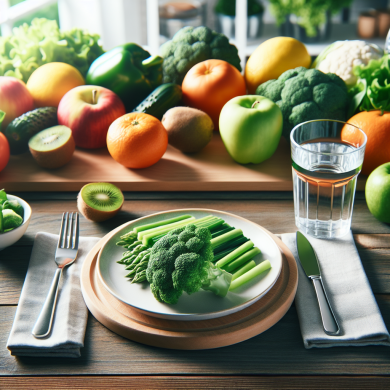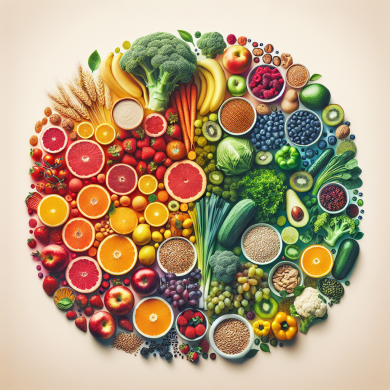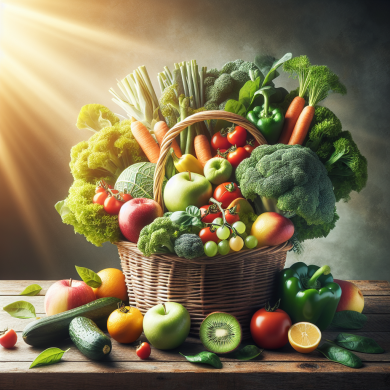Clean Eating vs. Processed Foods: A Nutritional Showdown
Introduction
In recent years, the concept of clean eating has gained significant traction in the world of nutrition. This dietary approach emphasizes the consumption of whole, unprocessed foods while minimizing the intake of processed foods. As people become more health-conscious, understanding the differences between clean eating and processed foods is crucial. This article aims to explore these two dietary paradigms, their nutritional implications, and how they impact overall health and wellbeing.
Understanding Clean Eating
Clean eating is a lifestyle choice that focuses on consuming foods in their most natural state. The philosophy behind clean eating is to nourish the body with whole, nutrient-dense foods while avoiding artificial additives, preservatives, and refined ingredients. Key components of clean eating include fruits, vegetables, lean proteins, whole grains, and healthy fats.
The Principles of Clean Eating
Clean eating revolves around several core principles. Firstly, it emphasizes the importance of whole foods. Whole foods are those that have been minimally processed, retaining their natural nutrients. Secondly, clean eating encourages the consumption of organic produce to avoid pesticides and genetically modified organisms (GMOs). Thirdly, it advocates for cooking at home, which allows individuals to control the ingredients and preparation methods used in their meals.
Nutritional Benefits of Clean Eating
Adopting a clean eating lifestyle offers numerous nutritional benefits. Whole foods are rich in essential vitamins, minerals, and antioxidants that support overall health. For example, fruits and vegetables provide fiber, which aids in digestion and supports a healthy gut microbiome. Lean proteins, such as chicken and fish, supply the body with amino acids necessary for muscle repair and growth. Additionally, healthy fats from sources like avocados and nuts contribute to cardiovascular health.
The World of Processed Foods
Processed foods are those that have been altered from their natural state through various methods, including canning, freezing, or adding preservatives. These foods often contain artificial ingredients, excessive sugar, and unhealthy fats to enhance flavor and extend shelf life. Common examples of processed foods include sugary cereals, packaged snacks, and fast food.
The Appeal of Processed Foods
Despite their negative reputation, processed foods remain popular due to their convenience and affordability. They are readily available, require minimal preparation, and have a long shelf life. For individuals with busy lifestyles, processed foods offer a quick and easy solution to meal preparation. Additionally, the food industry invests heavily in marketing, making processed foods appealing to consumers.
Nutritional Concerns of Processed Foods
While processed foods offer convenience, they often come with nutritional drawbacks. Many processed foods are high in added sugars, unhealthy fats, and sodium, contributing to various health issues such as obesity, heart disease, and hypertension. Furthermore, the consumption of processed foods has been linked to an increased risk of developing chronic diseases, including type 2 diabetes and certain cancers.
Comparing Clean Eating and Processed Foods
When comparing clean eating and processed foods, several key differences emerge. Clean eating prioritizes whole, nutrient-dense foods, while processed foods often lack essential nutrients. The dietary patterns associated with clean eating are typically higher in fiber, vitamins, and minerals, whereas processed foods are often calorie-dense and nutrient-poor.
Impact on Health
The impact of these dietary choices on health is significant. Clean eating has been associated with numerous health benefits, including improved weight management, better digestion, and enhanced mental clarity. The antioxidants found in whole foods help reduce inflammation and protect against oxidative stress, contributing to a lowered risk of chronic diseases.
In contrast, a diet high in processed foods can lead to negative health outcomes. The excessive intake of sugars and unhealthy fats can result in weight gain and metabolic disorders. Moreover, the additives and preservatives found in processed foods may have adverse effects on gut health and increase the risk of developing food intolerances or allergies.
Environmental Considerations
Beyond personal health, the choice between clean eating and processed foods also has environmental implications. Clean eating often involves supporting local and sustainable agriculture, which can reduce the carbon footprint associated with food production. By choosing organic and locally sourced foods, individuals can contribute to environmental conservation and promote biodiversity.
On the other hand, the production and distribution of processed foods can have a significant environmental impact. The industrial processes involved in manufacturing and packaging processed foods consume large amounts of energy and resources. Additionally, the transportation of these products over long distances contributes to greenhouse gas emissions.
Making Informed Choices
While clean eating is generally considered a healthier and more sustainable dietary approach, it is essential to recognize that not all processed foods are inherently unhealthy. Some minimally processed foods, such as frozen vegetables or canned beans, can be nutritious and convenient options. The key is to read labels carefully and choose products with minimal added ingredients and preservatives.
Practical Tips for Clean Eating
For those interested in adopting a clean eating lifestyle, here are some practical tips:
- Focus on whole foods: Prioritize fresh fruits, vegetables, whole grains, and lean proteins in your meals.
- Cook at home: Prepare meals from scratch to control the ingredients and cooking methods used.
- Choose organic: Opt for organic produce to reduce exposure to pesticides and GMOs.
- Read labels: Look for products with minimal ingredients and avoid those with artificial additives.
- Plan ahead: Prepare meals in advance to avoid relying on processed foods for convenience.
Conclusion
In the nutritional showdown between clean eating and processed foods, the former emerges as a more beneficial choice for both personal health and environmental sustainability. By prioritizing whole, nutrient-dense foods and minimizing the consumption of processed foods, individuals can enjoy a range of health benefits and contribute to a more sustainable food system. However, it is essential to make informed choices and recognize that not all processed foods are detrimental. Ultimately, the key to a healthy diet lies in balance, mindfulness, and a commitment to nourishing the body with wholesome foods.















Add comment